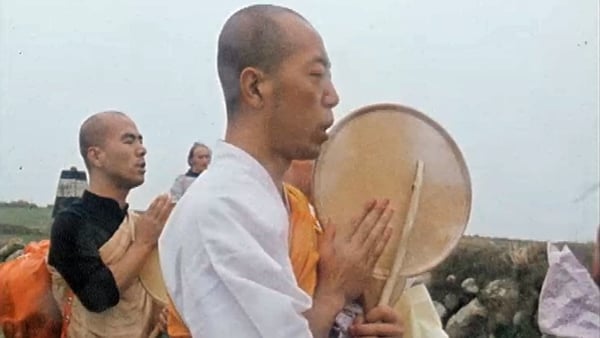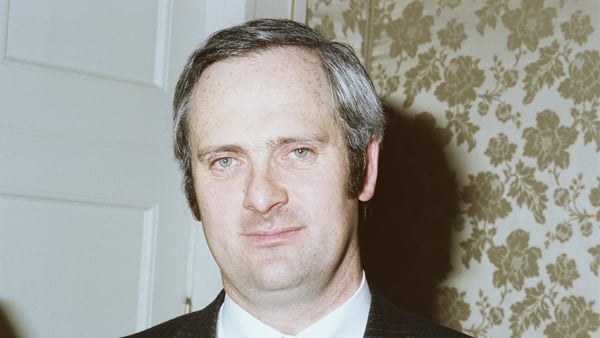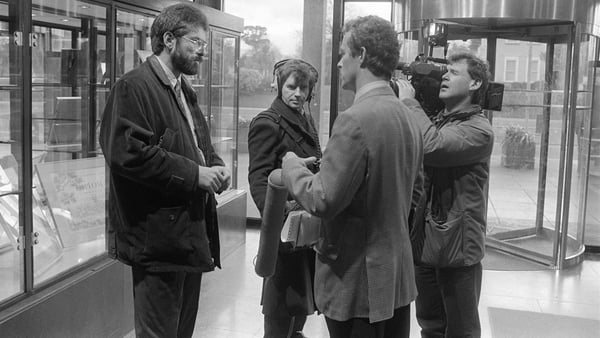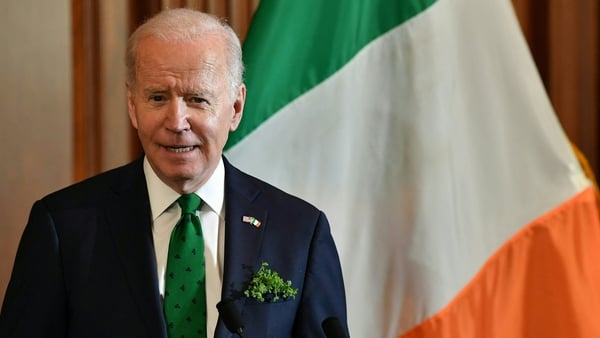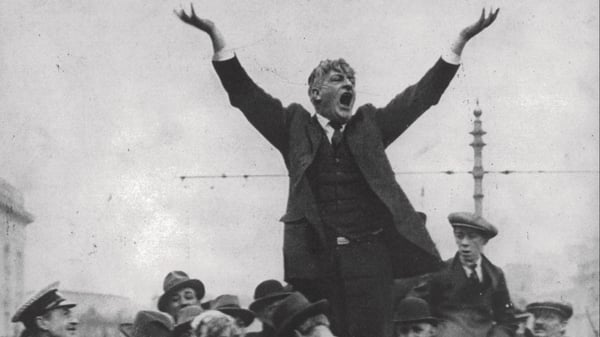Analysis: Irish politicians have faced murder, physical attacks, verbal abuse and online hate campaigns while doing their job over the last 100 years
‘A bag of sh.t was thrown at me’ are not the words any politician should utter in a modern liberal democracy. However, it was the recounted experience of Fianna Fáil’s Minister of State for Disability, Anne Rabbitte, and her constituency colleague, Fine Gael’s Ciarán Cannon, during a public meeting in Co Galway in January.
It subsequently emerged there were two bags of animal dung involved. According to the protestor himself, both were sealed, thrown on the floor near the TDs and were harmless props in a protest against a proposed Biogas facility in Galway.
We need your consent to load this rte-player contentWe use rte-player to manage extra content that can set cookies on your device and collect data about your activity. Please review their details and accept them to load the content.Manage Preferences
From RTÉ Radio 1's Liveline, Joe Baldwin on why he threw two bags of cow dung at two government TDs at a public meeting in Co Galway
Interpretations may vary, but one consequence was clear. For many politicians and commentators, the time had come to push back against an increasing and intensifying climate of abuse, harassment, and threats of violence towards public representatives. The vile online treatment of female politicians in particular attracted understandable attention. The Irish Times listed ‘death threats, rape threats, sexual harassment, a daily barrage of abuse on social media, TDs being followed, people hanging around their offices.’
Appearing on the Late Late Show, the Green Party’s Neasa Hourigan and the Social Democrats’ Holly Cairns both related examples of abuse they have received. Cairns recently installed CCTV following a stalking incident at her home, and Hourigan shocked the audience when she recalled being spat on in public.
Female politicians have recounted abuse including being spat at and having coins thrown at them, as well as an incident involving an election poster being displayed in a graveyard | Read more: https://t.co/OCo565tAWF pic.twitter.com/AwfY2ZxIO7
— RTÉ News (@rtenews) January 21, 2023
Discussing the same topic on Newstalk’s Pat Kenny Show, Cairns noted that ‘all politicians get abuse’, and she initially accepted it as part of the job. Kenny, a veteran commentator, acknowledged there had ‘always been [robust] political discourse’, but argued what Cairns recently endured was 'different’. Both agreed that social media has heralded a more negative climate for politicians. "In the UK two MPs have been murdered", said Cairns, "and you kind of have to ask the question: are we just waiting here for something really bad to happen before we act on this?"
This reference to the brutal murders of Jo Cox and David Amess is apt. Though from different British political traditions, both of these hardworking parliamentarians were targeted by ideological fanatics (one a neo-Nazi, the other a religious fundamentalist) that had been radicalised by online content. Cairns’ speculation appeared to highlight the dangers Irish politicians may yet face.
We need your consent to load this rte-player contentWe use rte-player to manage extra content that can set cookies on your device and collect data about your activity. Please review their details and accept them to load the content.Manage Preferences
From RTÉ Radio 1's Morning Ireland, Gino Kenny TD on the abuse he received after attending a counter-protest against anti-immigrant protests
Could what happened in the UK also occur here? Many would perhaps be surprised to learn that it already has. The establishment of an independent Irish state on December 6th 1922 should have marked a period of celebration. Instead, it occurred amidst a bitter civil war and harsh political climate.
That climate became even less pleasant the day after when a member of the governing Sinn Féin party, Seán Hales, was murdered by the anti-Treaty IRA on a Dublin street. Another TD, Pádraic Ó Máille, was also shot, but survived. Many viewed this attack as an attempt to destroy the essence of Irish democracy itself.
Indeed, it might have succeeded. Some TDs and senators panicked, resigned, and attempted to flee Dublin for safer climes. According to one source, members of the budding Irish secret service were despatched to find them, stiffen their resolve, and return them to Dublin to ensure parliamentary democracy could function.
We need your consent to load this rte-player contentWe use rte-player to manage extra content that can set cookies on your device and collect data about your activity. Please review their details and accept them to load the content.Manage Preferences
Ó RTÉ Raidió na Gaeltachta's Nuacht a hAon, údar agus saineolaí ar stair an tSaor Stáit Cormac Ó Comhraí ag caint faoi feallmhú Seán Hales TD sa bhliain 1922
Although the Government’s immediate reaction to Hales’ death – the extra-judicial execution of four anti-Treaty IRA leaders – is oft credited with neutralising the policy of murdering TDs, it did not end all violence towards politicians. Three days after Hales’ murder, an arson attack on the home of Sinn Féin TD, Seán McGarry, claimed the life of McGarry’s seven-year-old son.
Ten days later, another prominent former TD, Séamus Ó Duibhir, was murdered whilst working in his Dublin grocery shop. In January 1923, Senator Oliver St. John Gogarty evaded a kidnap attempt by jumping into the River Liffey. Senator John Bagwell was less fortunate: following the burning of his home, he was held captive for a number of days before escaping. Later, in February, anti-Treaty IRA murdered Thomas Higgins, the father of the Minister for Justice, Kevin O’Higgins.
While one may claim that the Civil War was unique and not comparable with threats facing politicians, there are arguable comparisons to be made from subsequent periods. In 1927, Kevin O’Higgins was himself murdered by anti-Treaty IRA members. Following Fianna Fáil’s accession to power in 1932, the political climate reverted briefly to something approximating Civil War intensity. Anti-Treaty IRA members attacked pro-Treaty politicians and meetings. In retaliation, some pro-Treatyite elements rallied to the Blueshirts, and street violence became commonplace. Although there were injuries and some tragic deaths during this time, no national politicians were killed.
We need your consent to load this rte-player contentWe use rte-player to manage extra content that can set cookies on your device and collect data about your activity. Please review their details and accept them to load the content.Manage Preferences
From RTÉ Radio 1's Today with Sean O'Rourke Show in 2019, Prof Diarmaid Ferriter from UCD profiles Eoin O'Duffy, the leader Of the Blueshirts
The departure of the Blueshirts and Fianna Fáil’s suppression of the anti-Treaty IRA during the Second World War heralded a broadly safer political environment throughout the 1940s, 1950s and 1960s. This changed with the onset of the Troubles in Northern Ireland. Many are aware of the violence experienced by politicians north of the Border, but representatives in the Republic also faced dangers.
Some TDs were threatened by paramilitaries, or had their homes ‘picketed’ at various times. Desmond O’Malley, Minister for Justice between 1970 and 1973, received death threats and carried a pistol for protection. In 1972 gardaí raided an apartment across the street from his accommodation, and a rifle with a telescopic scope was discovered.
In 1974, Government ministers learned their families were under threat of kidnapping, and were cautioned to make their children alert for the presence of strangers. That same year the first killing occurred of a member of parliament since 1927. During a blatantly sectarian attack on a family in Co Monaghan, the Provisional IRA murdered Protestant Fine Gael senator, Billy Fox.
We need your consent to load this rte-player contentWe use rte-player to manage extra content that can set cookies on your device and collect data about your activity. Please review their details and accept them to load the content.Manage Preferences
From RTÉ Archives, Charlie Bird reports for RTÉ News on protests faced by the leader of the Progressive Democrats Dessie O'Malley by members of Sinn Féin over section 31 of the Broadcasting Act during an election walkabout in Dublin's inner city.
More local matters proved to be a threat to politicians too. In 1982, during a heave against Charles Haughey, one of his opponents within Fianna Fáil, Jim Gibbons, was viciously assaulted by a mob of Haugheyites on the grounds of Leinster House. During another heave in 1983, many Haughey opponents received threatening phone calls: the Jewish Fianna Fáil TD, Ben Briscoe, being told 'Hitler should have finished the job'.
With the effective end of the Troubles in Northern Ireland, the exit of Haughey and an economic boom in the 1990s, politicians generally experienced more congenial atmospheres. But this would change in 2008 when the world economic crash heralded the age of austerity. Profligate spending based on a narrow taxation base in the good times meant Ireland suffered more than most western nations during recession and the sitting government faced the citizens' wrath. Constituency offices of TDs were vandalised, Government members were verbally abused on the street, and one minister was attacked with paint during a public event.
It could have been worse – and perhaps it was, for some members of the government that took over in 2011. Arriving as social media exploded in influence, much of the political class received a rough introduction to online political debate.
We need your consent to load this rte-player contentWe use rte-player to manage extra content that can set cookies on your device and collect data about your activity. Please review their details and accept them to load the content.Manage Preferences
From RTÉ Radio 1's News At One in 2019, Máiría Cahill on why she cannot run as a local election candidate in the north because she cannot give her address
Labour leader Joan Burton experienced both in-person verbal abuse, when her car was surrounded by a baying crowd in Tallaght in 2014, as well as misogynistic online attacks during that Dáil term. There was also sustained, deeply personalised and possibly co-ordinated social media abuse of former Labour senator Máiría Cahill. These are just two of many examples that could be cited, with representatives of every political stripe now reporting abuse or intimidation as a common feature of life today.
To those unfamiliar with the cycles of history, a bag of cow dung thrown at a politician you support may appear to be the pinnacle of abuse. If thrown at a politician you dislike, it may seem harmless, perhaps even humorous. But given what many of our representatives have faced since 1922, both views would be wrong. The act itself was wrong too – and a clear example of what is unacceptable in any liberal democracy.
The views expressed here are those of the author and do not represent or reflect the views of RTÉ



